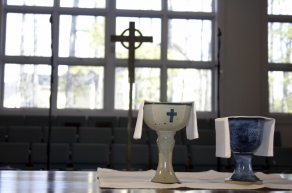
I find a lot of hope about the changing Church and its role in the changing world in those coming from outside our tradition. What do these folks have to say to us? Lots, it turns out. Can we hear it and respond in ways-appropriate-to-our-context? That's the big question, and much of what I have dedicated my life and ministry to. I issue this warning as when I work with parishes, vestries, bishops, seminarians, or whatever group of Episcopalians will have me, and then I share with them the seemingly bleak news that we must change or go home, believe it or not, they don't always thank me for being such a harbinger. That said, if you can keep an open mind, heart, and, well, ears, I think there is a lot of value, hope, and inspiration for where we are and where we are headed.
Continue reading...

A key ingredient for a healthy, vibrant congregation is a strong appreciation for the ministry of the laity as well as the ministry of the clergy. Shared collaborative leadership is critical for the spiritual growth of our congregations. However increasingly, there in an imbalance in our optimal leadership paradigm.
Many congregations are faced with the issue of no permanent clergy leadership and are continuously being served by supply clergy or have no clergy. This situation strains the effectiveness of the lay leadership and worsens the vitality issues of these congregations.
For many search committees, having the opportunity to discern the right clergy is increasingly difficult when there are fewer options. This may lead to a mismatch of expectations and inevitable conflict.
Continue reading...

Do you want to have meaningful conversations about spirituality, especially with non-members? If so, I encourage you to consider three principles.
First, avoid jargon. I define ‘jargon’ as any word you have not used outside of church activities during the last week. Certainly ‘exegesis’ applies, as do ‘salvation theory’, ‘eschatology’ and ‘incarnation’. But have you considered ‘narthex’ and ‘Eucharist’? My suggestion is if you find the need to use such words, explain them at the same time. In writing we would say ‘narthex’ (lobby).
I know! We went to school for a long time and want to make sure people know that. When I lead spiritual gifts identification workshops I say the real gift of tongues is shown by an accountant who can explain a balance sheet! Maybe there is a similar statement for clergy.
Continue reading...

In my book, Behold What You Are: Becoming the Body of Christ, I suggest defining liturgy as “the work of the people and a public work, expressing and forming of the Body of Christ, given for the world.” As such, whenever we find ourselves planning or preparing for a liturgy, we might ask:
How is this liturgy engaging the people?
How is this liturgy public?
How will this liturgy express who we are as the Body of Christ?
How will it form us as the Body of Christ, given for the world?
We can apply these questions to everything from how we welcome to how we sing, from how we collect the offerings to how we send people forth.
Continue reading...

The invitation was simple: “No agenda, just conversation. No pressure, just invitation.”
With these words, the rector and newcomers coordinator at Church of the Holy Communion in Memphis invited the members of St. Elisabeth’s Episcopal Church in nearby Bartlett, Tennessee to a service of Evening Prayer followed by a time of conversation. St. Elisabeth’s was about to close, and Holy Communion was not sure how best to help.
There is plenty of literature about how two congregations can start journeying together, but our story is not grounded in any particular theory. We just listened to each other, and we built a model that worked for us. Other churches in other places could easily do the same.
Continue reading...

At long last, the two congregations I serve as rector are now one church – one church, we say, in two locations. Church of the Ascension in Lexington Park, MD and St. George’s Church in Valley Lee, MD are now two churches, two campuses of Resurrection Parish: the Episcopal Diocese of Washington’s newest parish, indeed the newest parish in our entire Episcopal Church! It’s been a long time coming, not to mention an incredible process; I’ve blogged extensively about our discernment around this initiative on ECF Vital Practices.
To be very technical, we merged two parishes into one parish. That may not seem super groundbreaking unto itself, but let me provide some context. St. George’s in Valley Lee is Maryland’s oldest continuous Anglican / Episcopal worshipping community – dating back to 1638 – and it became the parish church of William & Mary Parish when, in 1692, the colony was subdivided into 30 Church of England parishes (so much for Maryland’s heritage of religious toleration; we, too, got an established church not long after our founding). Church of the Ascension, meanwhile, was planted in a brand-new, post-WWII suburb as a mission chapel in the 1950s – along with so many other Episcopal church buildings and institutions in American cultural life – and it became its own full-fledged parish (Patuxent Parish) in 1968. Thanks, Baby Boom!
Continue reading...

Over the past 500 years, the perception has been that the old world had all the answers: the science, technology, and advanced ways of living. Can that still be said? Or perceived as truth?
We are facing a monumental moral crisis. Consider these observations:
• The United States is deeply divided politically
• Income inequality is at an all-time high; poverty and homelessness are on the rise
• Pollution of the air, water, and land is contributing to climate change
• Rainforests are being destroyed each day, contributing to global warming, and thousands of native people in South America are being killed for trying to protect the earth
• More and more animal species are becoming extinct
• Violence is glorified on TV—guns are becoming a national pastime—some sports have become barbaric (UFC, WWA)—while mental health is in decline
Continue reading...

ECF President Donald Romanik is currently in Abilene, TX celebrating Holy week and Easter with his family. In this video, he shares Easter greetings in conversation with his son Rev. David Romanik, Rector at Church of the Heavenly Rest in Abilene, Texas. Blessings for Holy week and a hopeful Easter to all of you, from everyone at ECF.
Continue reading...







